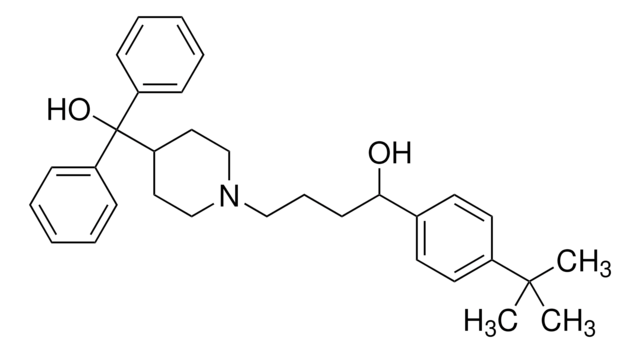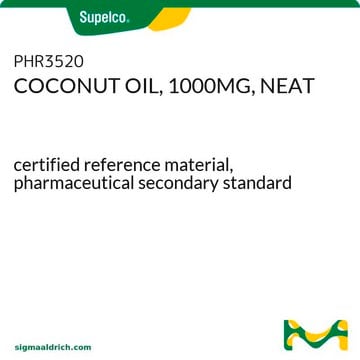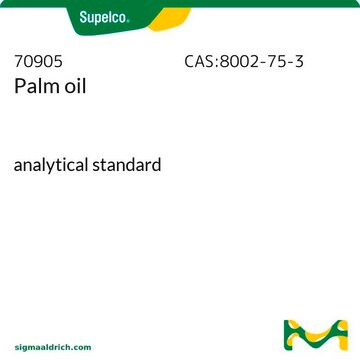C1758
Coconut oil from Cocos nucifera
low-melting solid
Synonym(s):
Coconut fat, Copra oil
Sign Into View Organizational & Contract Pricing
All Photos(2)
About This Item
Recommended Products
biological source
Cocos nucifera
Quality Level
form
low-melting solid
mp
23-27 °C
lipid type
oils
shipped in
ambient
storage temp.
room temp
Looking for similar products? Visit Product Comparison Guide
Application
- Linseed, Baru, and Coconut Oils: NMR-Based Metabolomics, Leukocyte Infiltration Potential In Vivo, and Their Oil Characterization. Are There Still Controversies: This research utilizes NMR-based metabolomics to explore the biochemical properties of various oils, including coconut oil, and investigates their potential for leukocyte infiltration in vivo. The findings contribute to understanding the health implications and biochemical interactions of coconut oil (Figueiredo et al., 2022).
Physical form
Usually a solid at room temperature
Storage Class Code
11 - Combustible Solids
WGK
WGK 1
Flash Point(F)
>235.4 °F - closed cup
Flash Point(C)
> 113 °C - closed cup
Personal Protective Equipment
dust mask type N95 (US), Eyeshields, Gloves
Choose from one of the most recent versions:
Already Own This Product?
Find documentation for the products that you have recently purchased in the Document Library.
Customers Also Viewed
Ryan Pannorfi et al.
Physiological and biochemical zoology : PBZ, 85(4), 405-414 (2012-06-19)
Heterothermic rodents increase self-selection of diets rich in polyunsaturated fatty acids (PUFAs) when exposed to cold, short days, or short-day melatonin profiles, and Djungarian hamsters (Phodopus sungorus) do so in long days in response to cold exposure alone. To determine
Young Taek Oh et al.
Physiology & behavior, 167, 194-201 (2016-10-25)
Previous rodent studies showed that when injected into the brain, free fatty acids (FFAs) reduced food intake in an oleate-specific manner. The present study was performed to test whether food intake is regulated by circulating FFAs in an oleate-specific manner.
Xuezhi Ding et al.
Tropical animal health and production, 44(7), 1541-1545 (2012-03-01)
The objective was to evaluate the effect of dietary coconut oil on methane (CH(4)) emissions and the microbial community in Tibetan sheep. Twelve animals were assigned to receive either a control diet (oaten hay) or a mixture diet containing concentrate
Jingcan Sun et al.
Food chemistry, 141(3), 2828-2832 (2013-07-23)
Ester synthesis was carried out in a solvent-free system of lipase, coconut oil and ethanol or fusel alcohols to ascertain the reaction mechanism. During ester formation, octanoic and decanoic acids increased initially and then decreased gradually, indicating that ester production
C Reveneau et al.
Journal of dairy science, 95(4), 2061-2069 (2012-03-31)
Feeding animal-vegetable (AV) fat or medium-chain fatty acids (FA) to dairy cows can decrease ruminal protozoal counts. However, combining moderate to large amounts of AV fat with monensin (tradename: Rumensin, R) could increase the risk for milk fat depression (MFD)
Our team of scientists has experience in all areas of research including Life Science, Material Science, Chemical Synthesis, Chromatography, Analytical and many others.
Contact Technical Service









